Your Unbiased Business Valuation in New York
Business valuations that comply with Revenue Ruling 59-60 and are designed to reflect real-world transactions
Unbiased Business Valuation in New York
Nielsen Valuation Group provides unbiased and reliable business valuation services in New York City, NY State and neighboring states. We operate in full compliance with IRS Revenue Ruling 59-60. Our appraisals thoroughly examine the situation of the business to determine fair market value. Free from speculation. Contact us today for a free 30-minute consultation.
- We always use the perspective of real-world buyers
- No predetermined formulas
- We do not use standardized capitalization rate tables
- Compliant with IRS Revenue Ruling 59-60
- Emphasizing precedents and case law
We Cover the Following Areas in NY
New York City
- Manhattan
- Brooklyn
- Queens
- The Bronx
- Staten Island
Other Cities and Counties
- Buffalo
- Rochester
- Yonkers
- Syracuse
- Albany
- Long Island
- Westchester
- Hudson Valley
- And more!
We will also be happy to help you with a business valuation in neighboring cities and states such as New Jersey, Pennsylvania & Philadelphia, Rhode Island and Connecticut.
Why Use Us for Your New York Business Valuation?
Nielsen Valuation Group believes in providing fair market business valuations that reflect real world transactions. This is in contrast to purely theoretical calculations using predetermined formulas, oversimplifications, or pure speculation, if you will.
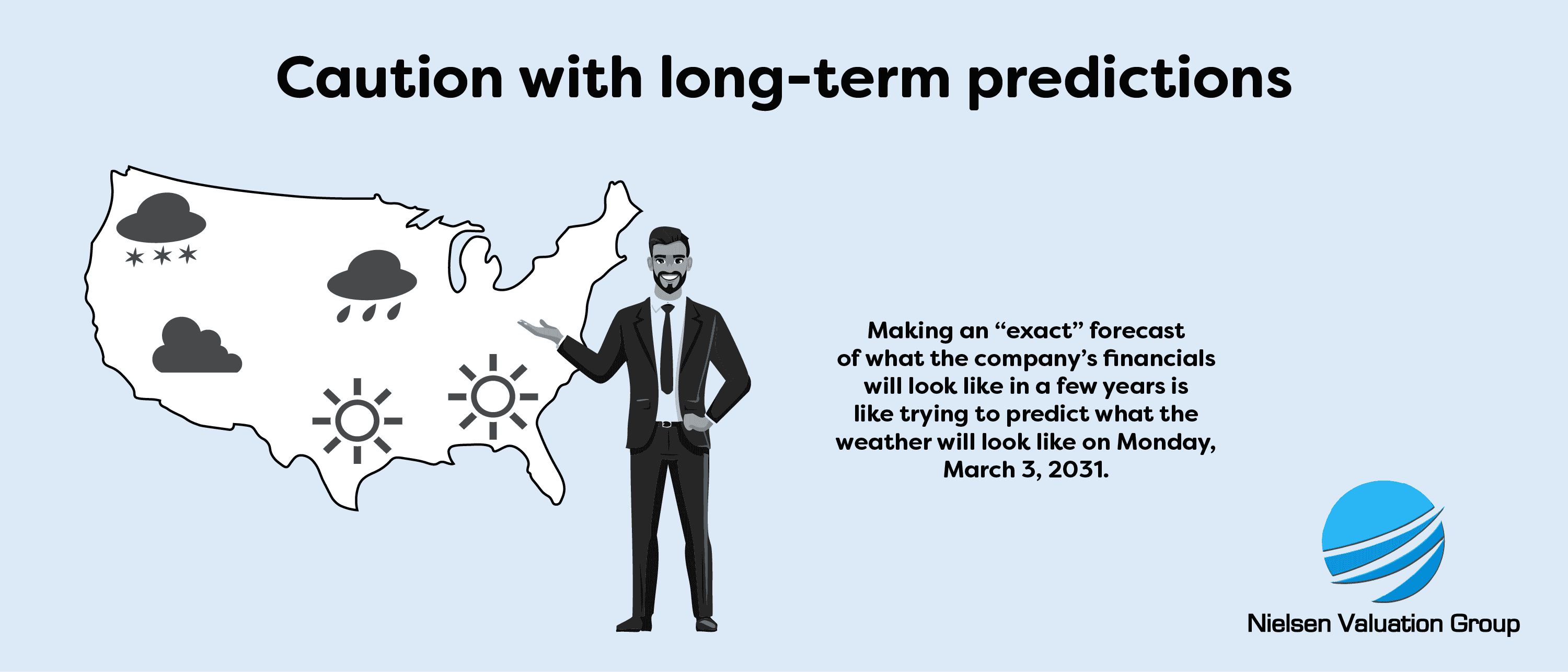
Our approach reflects the spirit of the Internal Revenue Service (IRS) Revenue Ruling 59-60, which we fully comply with.
We believe that whatever the purpose of the valuation, the goal is to find a credible market value, not just a “value on paper”.
In the following paragraphs, we explain in more detail how we accomplish this.
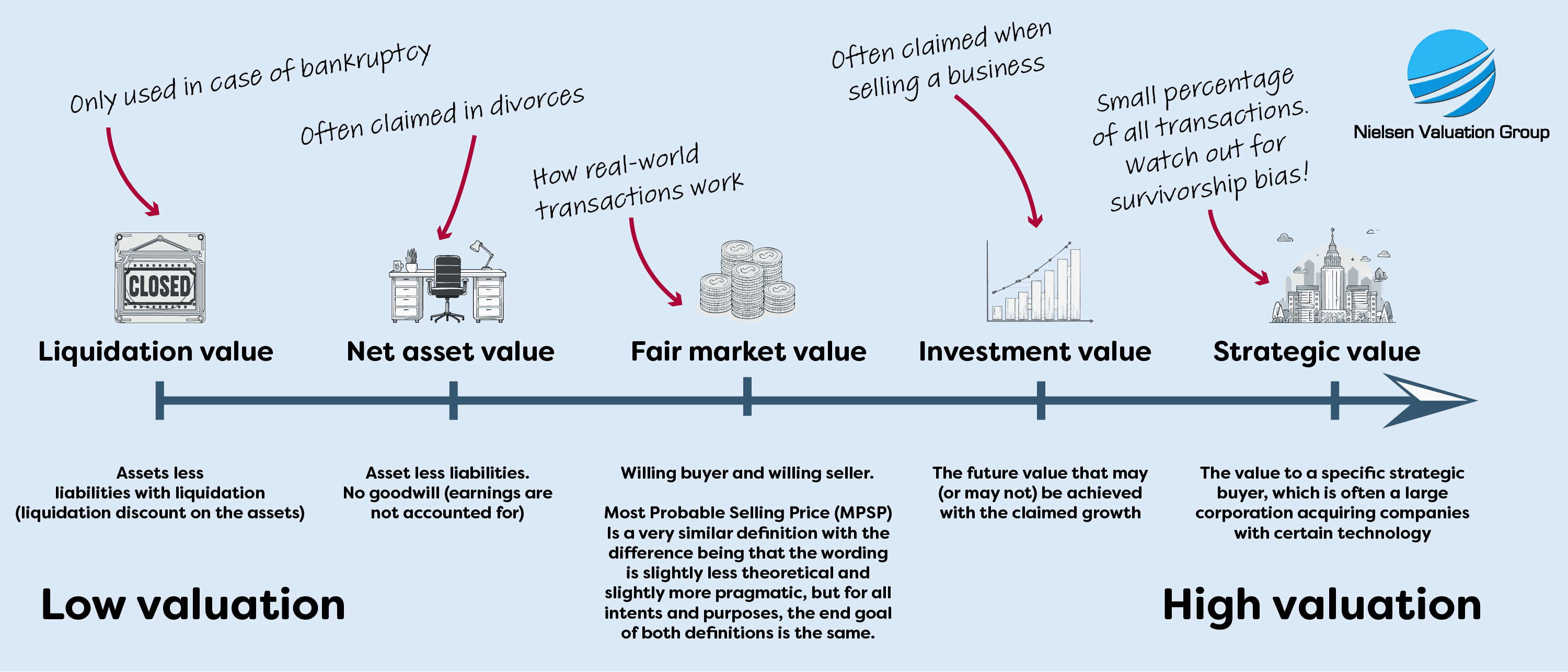
Fair Market Value & IRS Revenue Ruling 59-60
Business valuation firms use a variety of methods to value businesses. Surprisingly few follow the guidelines outlined in IRS Revenue Ruling 59-60.
This ruling makes a lot of sense to us. Not only because it is an authoritative and trustworthy source, but also because it reflects how real market transactions work.
Fair market value is the price at which a hypothetical buyer and seller are willing to agree. Any valuation that is set higher or lower than fair market value is of little use.
The ruling makes some important points to consider when valuing a business. For example:
- Pre-determined formulas cannot be used to calculate the value of a business
- Standardized tables of capitalization rates can be misleading
- It is important to consider actual risks, the irregularity or stability of earnings, and the nature of the business
Here are some quotes from the ruling:
“No general formula may be given that is applicable to the many different valuation situations arising in the valuation”
“Valuations cannot be made on the basis of a prescribed formula.”
”No standard tables of capitalization rates applicable to closely held corporations can be formulated.”
“Such a process excludes active consideration of other pertinent factors, and the end result cannot be supported by a realistic application of the significant facts in the case except by mere chance.”
When we perform a New York business valuation, we uncover what is happening in the business. We look at its track record, its current situation, we analyze its earnings, its risks, its ownership structure and its prospects. We do not simply plug numbers from the books into a formula.
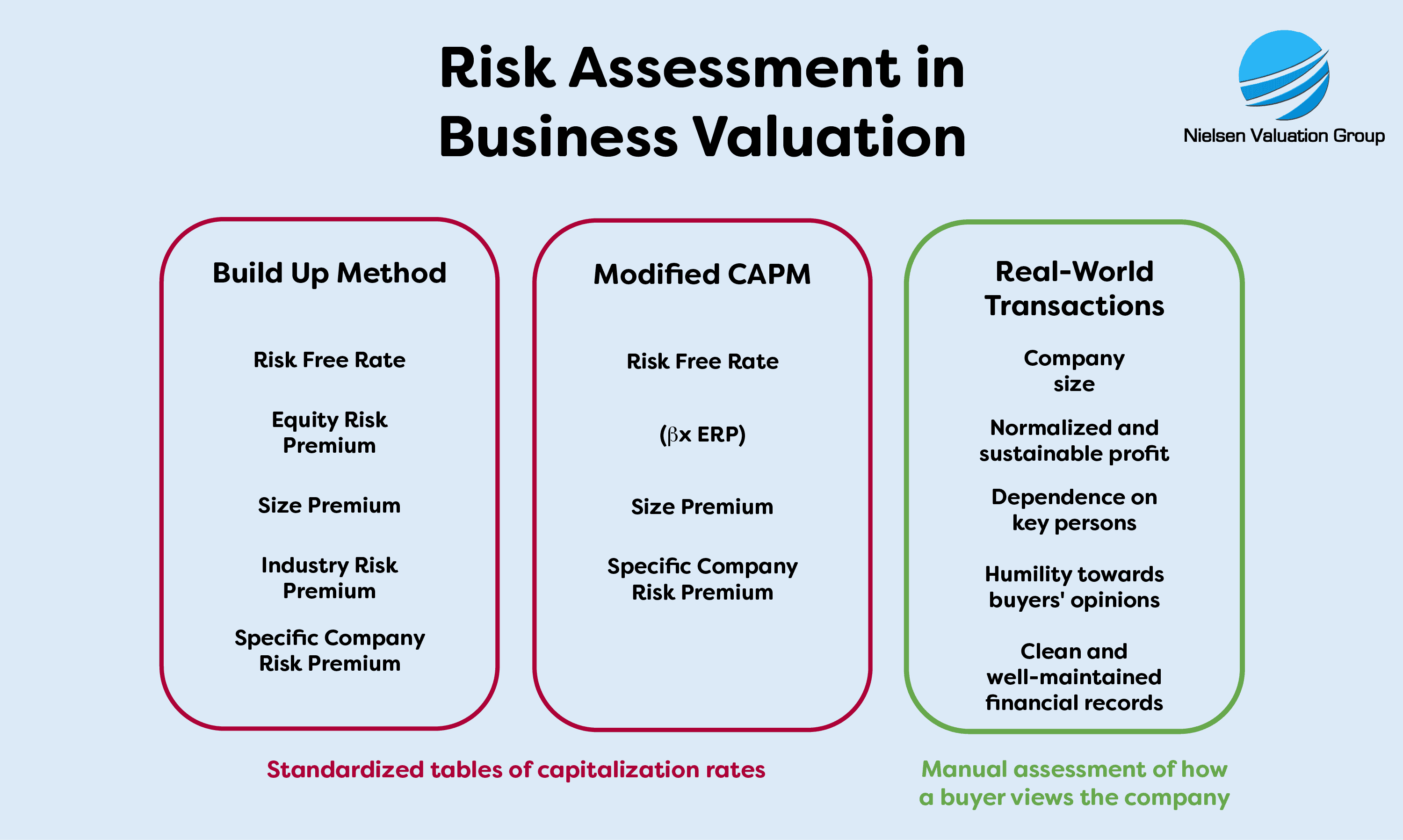
We Start by Normalizing the Financial Statements
The calculations of a business appraisal are relatively quick. What takes time is the preparation. We can compare it to the prep work in a paint shop. The calculations in a valuation are like applying the paint.
Normalizing the financial statements means two things:
- The balance sheet contains the book value of assets and liabilities. For a valuation, however, we need to know the market value. So the balance sheet needs to be adjusted to reflect the market value of the assets. Sometimes the liabilities also need to be adjusted.
- Income statements show income and expenses. However, they cannot be taken at face value in a valuation. For example, there may be one-time expenses or income, or the business may have paid for the owner’s personal expenses.
Once the balance sheet and income statements have been normalized, we have a clean starting point for our business valuation to determine the fair market value of the business.
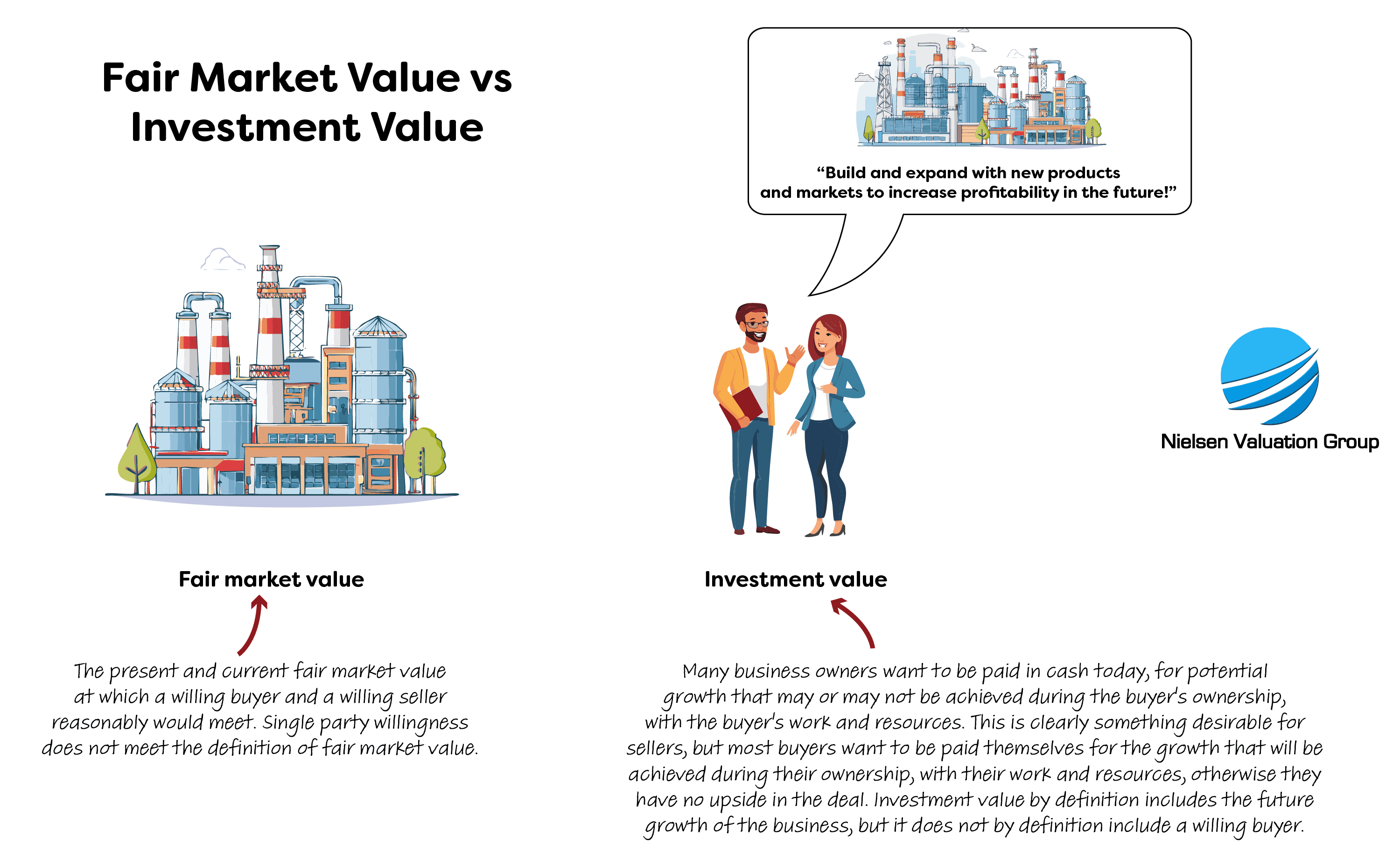
The Art of Selecting Valuation Approaches
Every business valuation uses one or more valuation approaches. This is not the same as using predefined formulas. We do not use formulas. Instead, we select relevant approaches and apply them to the business in question and with regard to the purpose of the valuation.
The following approaches may be used:
- Market approach: Looks at what similar businesses in the same niche have sold for in New York.
- Asset approach: Valuation based on the net asset value of the company’s assets after deducting liabilities.
- Income approach: An analysis of the value of the business based on its earnings or cash flow.
We often use a combination of the asset approach and then the income approach to provide a robust valuation that reflects true market prices.
Sometimes we apply discount rates, for example when valuing a distressed company or a company in liquidation. In doing so, we never use theoretical assumptions, but rather look at the general practice in the market.
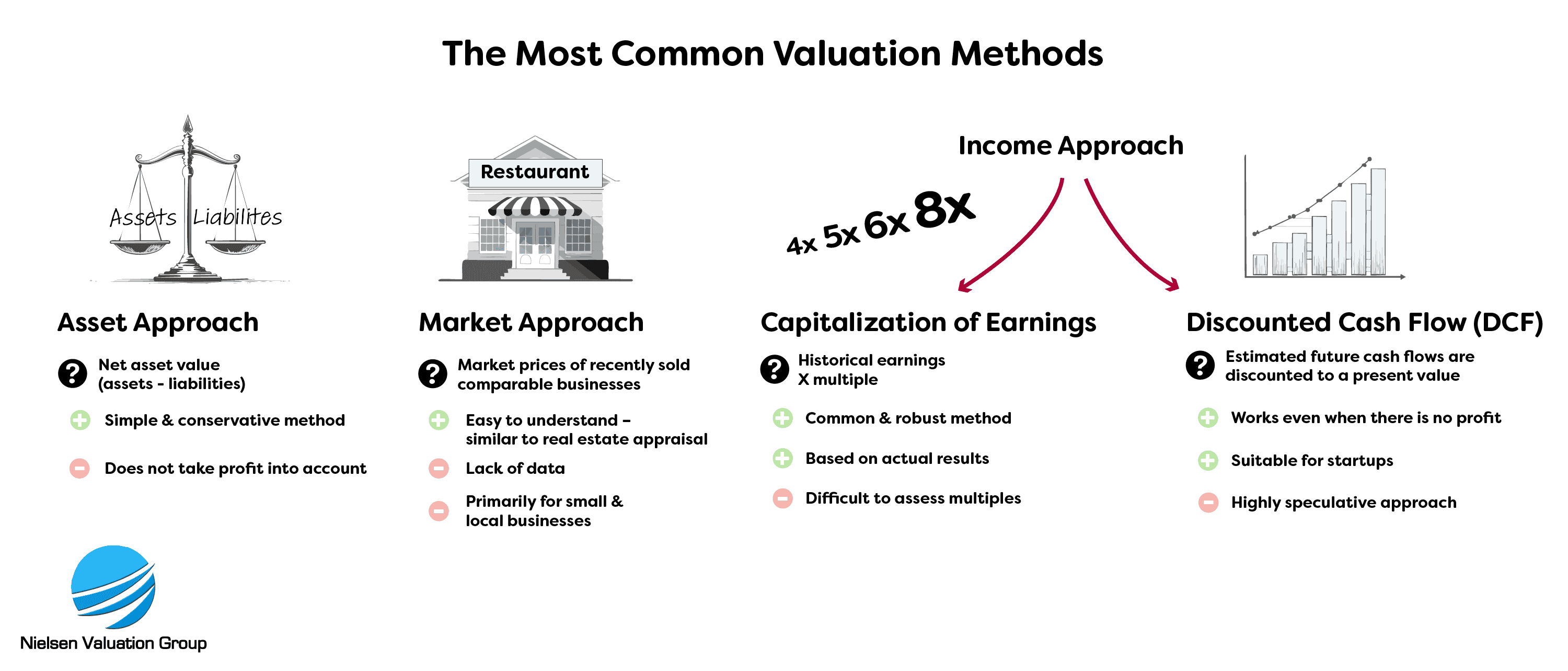
With Us Your New York Business Valuation is Always Customized
When you hire Nielsen Valuation Group for a business valuation in New York, you get a 100% customized report. The type of business, its size and situation, and the purpose of the valuation all affect how we prepare the report.
To make sure you get what you need and don’t overpay for what you don’t need, we offer a free 30-minute consultation. During our meeting, you will have the opportunity to briefly present the business in question and tell us why you need a valuation.
“Because valuations cannot be made on the basis of a prescribed formula, there is no means whereby the various applicable factors in a particular case can be assigned mathematical weights in deriving the fair market value. For this reason, no useful purpose is served by taking an average of several factors.“ IRS RR 59-60
What is My New York Business Worth?
If you are looking to sell your business in New York and need a business valuation to set the price, remember that value is what someone is willing to pay.
We are aware that there are many valuation firms that provide purely theoretical values. Such valuations will not help you find a buyer.
“Prior earnings records usually are the most reliable guide as to the future expectancy, but resort to arbitrary five-or-ten-year averages without regard to current trends or future prospects will not produce a realistic valuation.” IRS RR 59-60
Instead, what we do is determine the fair market value of the business, its likely price in an open and free market.
When we talk and meet with sellers of businesses, we often encounter two misconceptions:
- One is about potential. Sellers often want to be paid for untapped potential. Buyers, on the other hand, will not pay for potential because any future value will be the result of their work and risk-taking.
- The other misconception is about long-term risk versus value. Many entrepreneurs, especially startups, suffer from survivorship bias. When they look at success stories like Alphabet, Tesla, Meta or Uber, they point out to investors that their company is likely to follow the same path. However, investors who have seen many similar cases know that only about 10% of startups survive in the long run, which affects how much they can offer for shares in the company.
In both situations, you as a seller will benefit from an unbiased and independent business valuation based on fair market value.

In this illustration, we have illustrated the concept of survivorship bias and how it was originally coined. The term comes from World War II, when analysts looked at the damage on returning planes to decide where to reinforce them. Since there was no damage to the cockpit or engines, they incorrectly concluded that these areas did not need strengthening. The reality was that planes hit in those areas never returned. The conclusions were based on survivors.
Let Us Help You with Your Business Valuation
Nielsen Valuation Group delivers unbiased, IRS RR 59-60 compliant business valuations in New York, grounded in real-world transactions. Contact us today for a free 30-minute meeting.
FAQ – Frequently Asked Questions
How long does a New York business valuation take?
After we receive your order confirmation, we deliver the report within 5 to 15 days. We will indicate the delivery time in the quote. Please let us know if you need a faster turnaround.
How much does a business valuation cost?
The price varies and depends mainly on the complexity of the business being valued and the purpose of the valuation.
Will you value any type of business?
Yes, we do all types of New York business valuations, except for pure startup companies.
Can you visit a business in New York?
Yes, we can. We value businesses throughout the United States and our business valuation analyst can conduct site visits in any state, including New York or neighboring states. If necessary, we will also conduct interviews with employees and management.
Will the valuation be admissible in court?
Yes, we have successfully provided businesses and individuals with business appraisals that have been used in litigate. Just let us know at the time of ordering that the assessment will be used for legal matters.
What kind of business valuation services do you provide?
We can help you with business appraisals for all situations, including:
- Selling or buying a business
- Investments and M&A
- Partner buyouts
- Buy-sell agreements
- ESOP
- Shareholder or partner disputes
- Business liquidation or restructuring
- Divorce or litigation
- Estate planning
- Tax purposes
- And more!

Christoffer Nielsen
Experienced expert in business valuation, litigation and transactions
[email protected]
(737) 232-0838
Want to go with a cheaper option or even do the valuation yourself?
Nothing is stopping you, but...

You may lose the lawsuit, due to the valuation failing to be waterproof.

You may never settle the conflict, hurting the relationship with your counterpart.

You may get deceived while entering or exiting your partnership.
Tell us how we can help you
Personal service & IRS RR 59-60 compliant valuations – reach out with confidence
